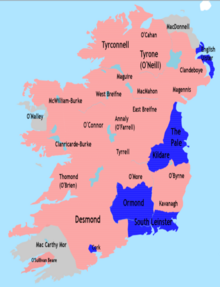
Back حرب التسع سنوات (أيرلندا) Arabic Brezel an nav bloaz (Iwerzhon) Breton Neunjähriger Krieg (Irland) German Naŭjara milito (Irlando) Esperanto Guerra de los Nueve Años (Irlanda) Spanish Yhdeksänvuotinen sota (Irlanti) Finnish Guerre de Neuf Ans en Irlande French Cogadh na Naoi mBliana (Éire) Irish Perang Sembilan Tahun (Irlandia) ID Guerra dei nove anni (Irlanda) Italian
This article needs additional citations for verification. (November 2021) |
The Nine Years' War, sometimes called Tyrone's Rebellion,[1][2] took place in Ireland from 1593 to 1603. It was fought between an Irish confederacy—led mainly by Hugh O'Neill of Tyrone and Hugh Roe O'Donnell of Tyrconnell—against English rule in Ireland, and was a response to the ongoing Tudor conquest of Ireland. The war began in Ulster and northern Connacht, but eventually engulfed the entire island. The Irish alliance won numerous victories against the English forces in Ireland, such as the Battle of Clontibret (1595) and the Battle of the Yellow Ford (1598), but the English won a pivotal victory against the alliance and their Spanish allies in the siege of Kinsale (1601–02). The war ended with the Treaty of Mellifont (1603). Many of the defeated northern lords left Ireland to seek support for a new uprising in the Flight of the Earls (1607), never to return. This marked the end of Gaelic Ireland and created the groundwork for the foundation of the Plantation of Ulster.[3]
The war against O'Neill and his allies was the largest conflict fought by England in the Elizabethan era. At the height of the conflict (1600–1601) more than 18,000 soldiers were fighting in the English army in Ireland.[4] By contrast, the English army assisting the Dutch during the Eighty Years' War was never more than 12,000 strong at any one time.[4]
- ^ Morgan 1993.
- ^ O'Neill 2017, p. 16.
- ^ Farrell, Gerard (10 October 2017). The 'Mere Irish' and the Colonisation of Ulster, 1570-1641. Springer. ISBN 978-3-319-59363-0.
- ^ a b Falls, Elizabeth's Irish Wars, pg 49
